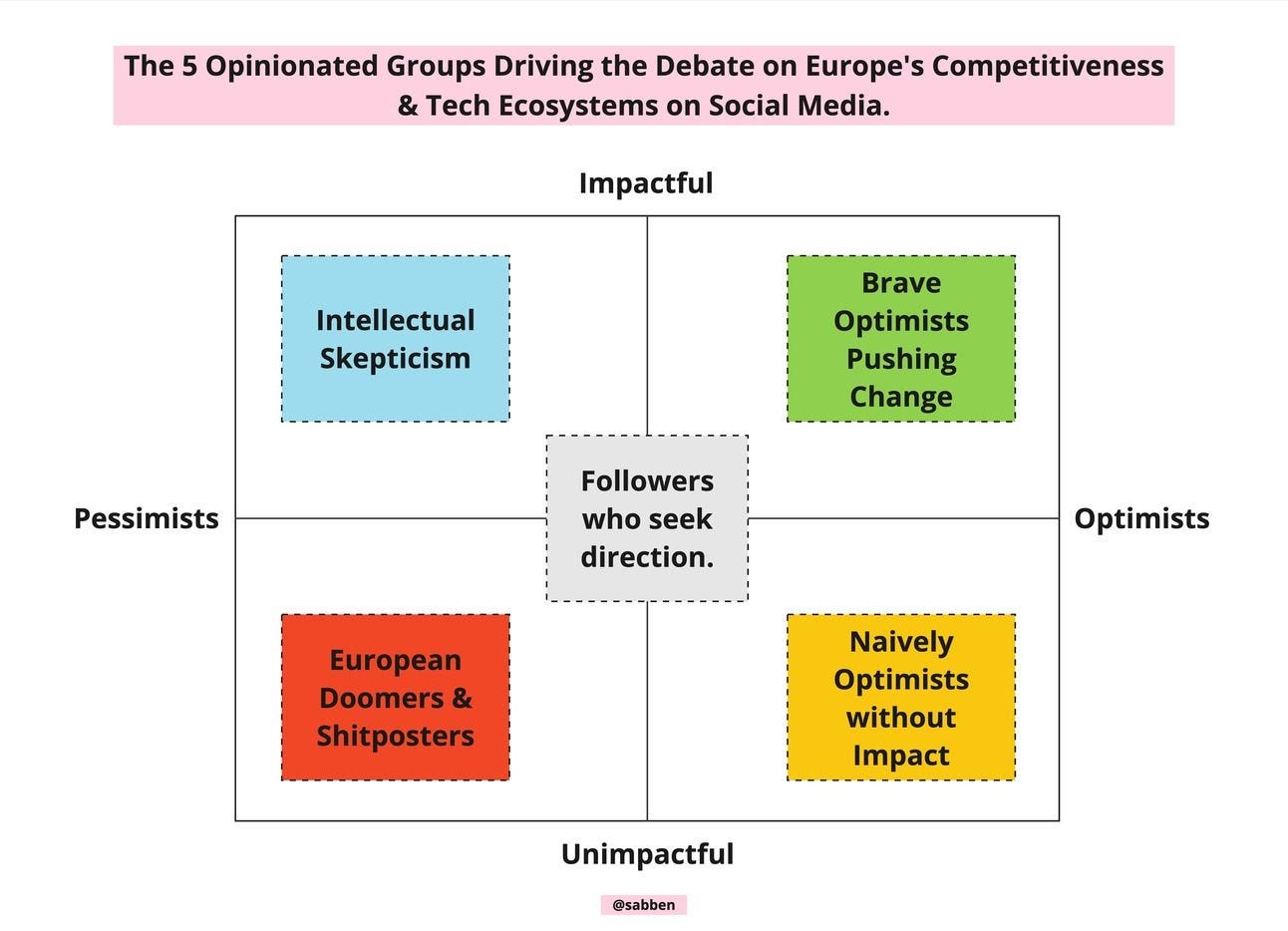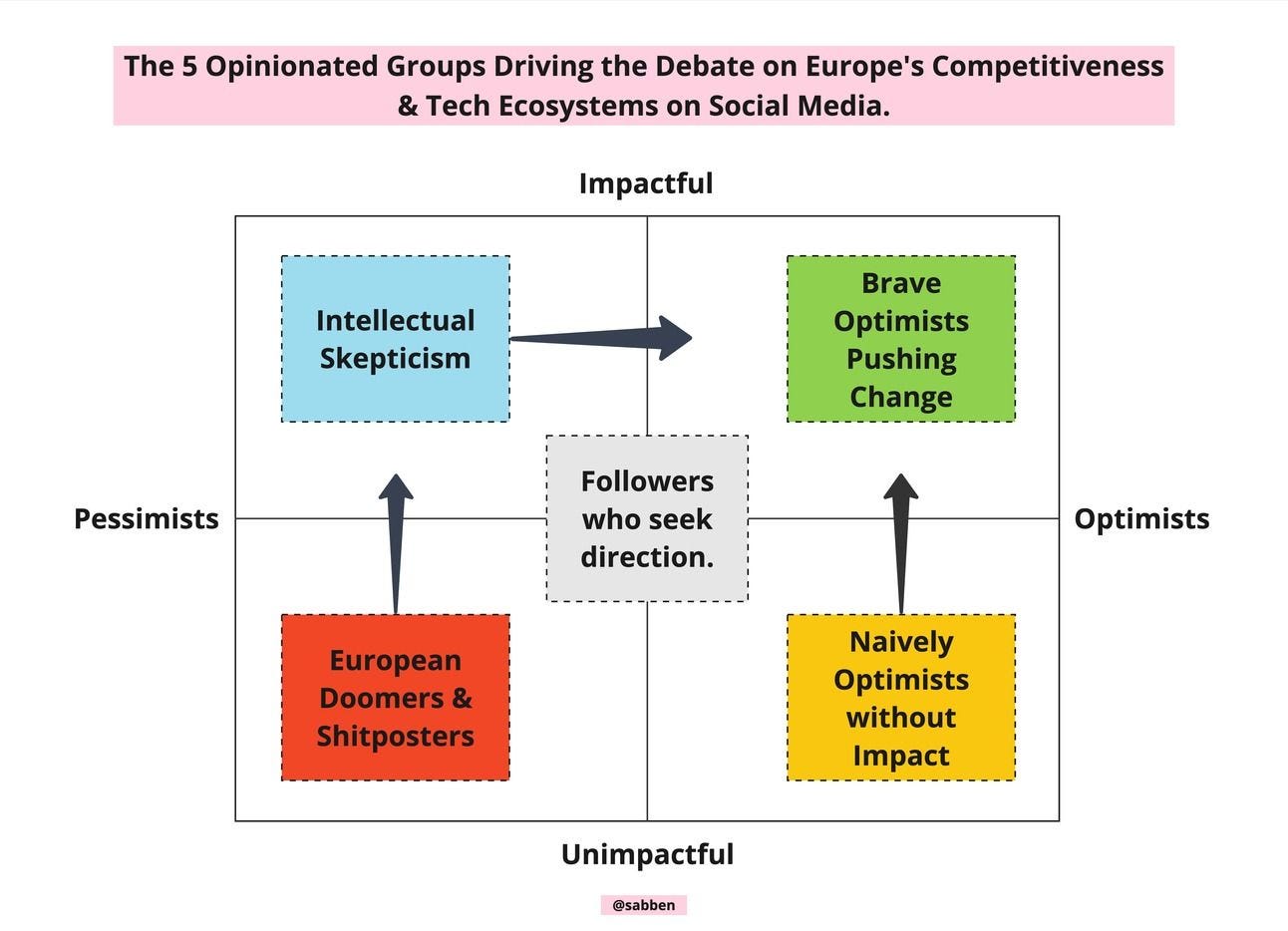Europe’s Future: The 5 Opinionated Groups Driving the Debate on Europe's Competitiveness & Tech Ecosystems on Social Media.
The zeitgeist in Europe is changing.
There is growing momentum to fix Europe. Time for New Europe. Momentum to improve our competitiveness, and build our own tech ecosystems that support entrepreneurs and scientists. Finally after 15 years… 😅
→ Reminder: Technology Power > Economic Power > Geopolitical power. If Europe loses its technical power, it also loses military and geopolitical power. Our sovereignty and freedom are on the line.
Yes, I know we face significant challenges, but this shift in attitude is a start. It’s a different vibe shift one that gives hope to younger generations to speak up and demand change.
What’s important for change? Influence public opinion + keep momentum.
We must influence public opinion, ensure that initiatives have real impact, and prevent the European Commission + local countries from derailing progress with long, ineffective implementations. Or that Europe is now focusing heavily on defence tech.
Currently, there are five categories of people in Europe with strong opinions and influence on this movement and the changes that need to happen.
You can map them across two axes:
Optimists vs. Pessimists (in terms of mindset)
Impactful doers vs. Unimpactful doers (in terms of action)
The 5 Opinionated Groups Driving the Debate
Let me explain the five categories:
1. Naively Optimistic but Without Impact
The “it will just work out, let’s focus on building” attitude.
Lacks urgency or an active approach to systemic change.
Some cherry-pick facts to fit a preferred narrative, often as a coping mechanism (e.g., “Europe has a high quality of life, so everything is fine”).
2. Brave Optimists Pushing Change
Believe in Europe’s potential but recognise the need for systemic & leadership change.
Action-oriented, working on initiatives with clear goals.
Strongly opinionated and vocal, regardless of what’s popular.
3. European Doomers & Shitposters
European doomers or US VCs who want to see Europe fail.
Shitposters on social media who recycle the “European water bottle” meme.
Not actively building or contributing and some emigrated outside of Europe.
4. Intellectual Skeptics
Annoying, but valuable. They challenge the status quo.
Critically evaluate narratives and expose groupthink.
Can be constructive (helping with impact) or not (simply questioning everything without offering solutions).
5. Followers Seeking Direction
Bandwagoners who follow what’s popular.
Influenced by mainstream media narratives.
Avoid risk-taking and prefer to align with the winning team. ‘Self-celebrating crowds’
How to Use This Mental Model? And Why It Matters
People can fall into different categories depending on the topic, their beliefs, or personal style.
When we talk about impact, we don’t just mean founding a tech company. The real challenge is changing systems, mindsets, and culture to make Europe more competitive.
Being a successful founder or VC does not automatically mean you understand tech ecosystem building. Nor does it mean your opinions on the topic are necessarily valid or correct. A great medical doctor isn’t automatically a great hospital CEO. Tech ecosystems are complex systems within complex systems—influenced by multiple stakeholders and public opinion, with both short- and long-term effects. More on this here.
“Don’t hate the player, hate the game.” This isn’t about attacking individuals or winning arguments. Everyone is playing a theatre role and wears a mask. The goal is to unite, have healthier discussions and change systems and encourage self-reflection on beliefs and opinions.
Examples of People on Social Media by Category
Brave Optimists Pushing Change:
Pieter Levels (EUACC), Fidias Panayiotou (YouTuber turned MEP), Andreas Klinger (EU-inc.org). More brave European Warriors here.
Naively Optimistic but Without Impact:
Startup founders who say, “Stop complaining, just build”. Gen X/Boomer VCs who worry about Europe but only say, “We need more optimism” without action. 🤷🏼♂️ example 1 or example 2.
European Doomers & Shitposters:
Marc Andreessen, Delian are examples who enjoy shitposting about Europe. Or others who have moved to the UAE or elsewhere, and have an incentive to take the European doomer position.
Intellectual Skeptics:
Writers of in-depth critiques on Europe who remain skeptical. Some work in mainstream media. Examples are Andrew McAfee, Ole Lehmann, Holger Zschaepitz or Michael Jackson.
How to Engage with Each Group?
Naively Optimistic but Without Impact
Explain why optimism alone isn’t enough. Concrete steps and actions matter.
Ask how they plan to tackle hard realities.
Differentiate between hope and optimism.
Highlight action-driven initiatives from Brave Optimists Pushing Change.
Use Dealroom data to counter cherry-picked arguments.
Brave Optimists Pushing Change
Support them. They’re the ones driving real progress.
Share their work, but also challenge them when necessary (e.g., when debates become too political or personal rather than truth seeking).
Intellectual Skeptics
Assess whether their critiques are constructive.
Show real-world success stories with execution power as counterexamples.
If their skepticism is media-driven, present alternative data points and emphasise shifting public opinion.
European Doomers & Shitposters
Ignore them. Save your energy.
Followers Seeking Direction
Offer clear explanations of your position and your thorough process.
Recommend key people for them to follow.
How to Engage with Each Group?
Final thoughts
Europe is at a turning point.
The more we unite as a tech ecosystem, the better. We need to understand each other, listen more attentively, engage in healthy discussions, and recognise that we are on the same team. We need a new Europe.
We still face many obstacles. Legacy corporations with a lot to lose, bureaucratic red tape, mainstream media's negative stance on tech, and the woke movement shaping public opinion. Or the old traditional leadership that is upset after Vice President JD Vance speech in Paris and Munich Security Conference, about failing European values and lack of freedom of speech: “The biggest threat to Europe isn’t external, it’s internal. A retreat from its own fundamental values, values shared with the U.S.”
The road ahead will be bumpy, but the fight is worth it. This is about Europe’s future.
Hope for a younger generation of leaders to take over, fix Europe and accelerate our future.
How we win:
Unite as one tech ecosystem. Be proud—"Made in Europe."
Shape public opinion through social media. Social media is our weapon.
Build momentum.
Leverage momentum to demand true change. Educate policy makers, show the data. Don’t be afraid to break traditional systems.
Sustain momentum. Repeat step 2.





